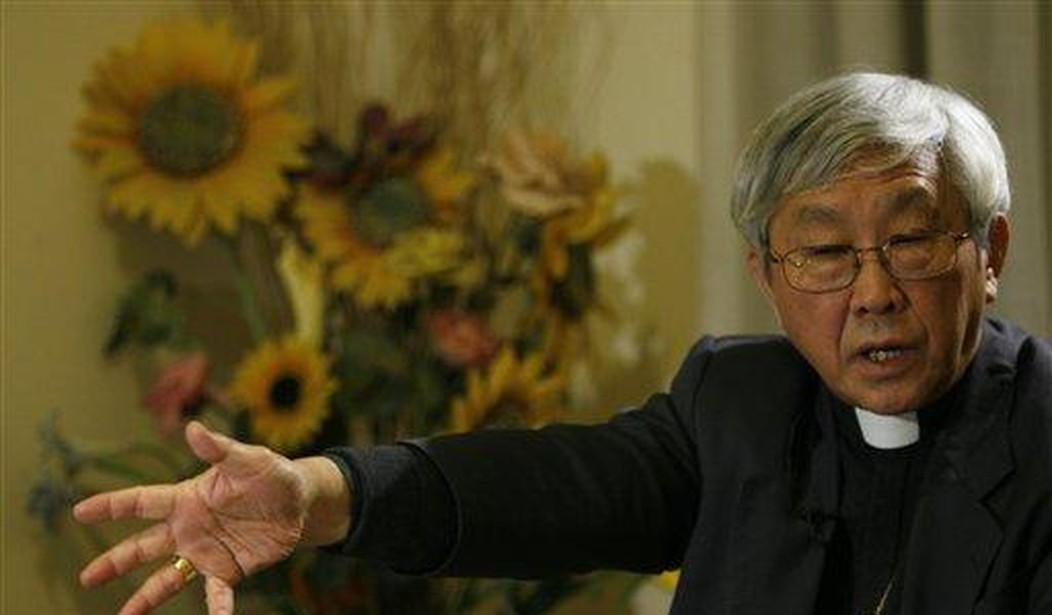Cardinal Joseph Zen, an 87-year-old native of Shanghai who served as bishop of Hong Kong, is a Chinese patriot and faithful Catholic.
He now finds himself at odds with both the atheist government that controls China and the Vatican bureaucracy that controls the foreign relations of the Holy See.
As of now, the atheist government in Beijing and the bureaucrats in the Vatican are acting as if they were allies, having signed a deal last September that neither the Vatican nor the communists have released to the public, and that will govern how Catholic bishops are appointed in China.
Cardinal Zen is speaking out against this deal and courageously explaining why it will hurt both the Chinese people and the Catholic Church.
The State Department's most recent reports on human rights and religious freedom help put the deal in perspective.
Is China run by the Communist Party? Yes.
The State Department report on human rights in China published last April says, "The People's Republic of China (PRC) ... is an authoritarian state in which the Chinese Communist Party (CCP) is the paramount authority."
Is the Communist Party atheist? Yes.
The State Department report on religious freedom in China published last May says, "CCP members and members of the armed forces are required to be atheists and are forbidden from engaging in religious practice."
Does China's atheist regime try to force Catholics to act in ways that are contrary to their faith? Yes.
Since the communists seized power in 1949, the Catholic Church has been divided in China. There has been an "underground" church, whose bishops have been appointed by the pope, and which does not bow to the government on matters of faith.
The Chinese government has imprisoned many bishops and priests of this underground church because they refused to deny their faith.
Recommended
Then there has been an "officially recognized" church known as the Catholic Patriotic Association (CPA). The State Department said last May: "The CPA does not recognize the authority of the Holy See to appoint Catholic bishops. ... The Regulation on the Election and Consecration of Bishops requires candidate bishops to publicly pledge support for the CCP."
So, a man appointed as a bishop in China's "official" church could only qualify for that position if he were to pledge support for a party that demands its members be atheists.
Can a Catholic bishop pledge support for an organization that mandates atheism? Of course not.
Yet last Sept. 22, Cardinal Pietro Parolin, the Vatican secretary of state, announced that the Holy See had signed a "Provisional Agreement between the Holy See and the People's Republic of China Concerning the nomination of Bishops." He also indicated that the bishops in China's "official" church had been legitimized. But the Vatican did not release the text of the agreement or explain in detail what is in it.
Nor did they tell Cardinal Zen or other faithful Chinese Catholics.
"We know nothing precise because it is a secret," Zen told me in a Jan. 28 interview. "And I have no more communication with the Vatican. I am marginalized. So, I don't know the content of the agreement."
"Now, we make our conjectures. We try to guess, because some details leaked out," Zen said.
Perhaps the most specific leak was made to America Magazine. Four days before the deal was signed, in a story crediting "informed sources," the magazine described a process in which "Beijing authorities" would have control over who could be nominated as a Catholic bishop.
"Candidates will be chosen at the diocesan level through the 'democratic election' system that the Chinese authorities introduced in 1957, whereby the priests of the diocese, together with representatives of women religious and laypeople, vote from among the candidates presented by the authorities that supervise church affairs," said America Magazine.
"The results of these elections will be sent to the Beijing authorities that oversee the church in China, including the bishops' conference, which will examine them and then submit a name to the Holy See," said America.
"The Holy See will have some months to carry out its own investigation of the candidate and, based on this work, the pope will either approve or exercise his veto," said America.
But the pope would not be able nominate his own bishop.
"He has the last word to say yes or no. That is all he can do," said Cardinal Zen.
"So, ultimately, control over who gets to become a bishop is now in the hands of the Chinese government?" this writer asked Cardinal Zen.
"Exactly. According to our conjecture," the cardinal said. "We cannot 100 percent conclude. We haven't seen the text."
Cardinal Zen recently published a book -- "For Love of My People I Will Not Remain Silent" -- which includes eight lectures he delivered in 2017. The final lecture expressed foreboding about the negotiations then underway between the Vatican and Beijing.
"To us, a terrifying scenario is unfolding, the sellout of our church!" Zen said then. "There is no essential freedom but the semblance of freedom. Not reconstituted unity, but forced cohabitation in the cage. From the point of view of the faith, we cannot see any gain."
"Aren't the gentlemen in the Vatican saying that the purpose of an agreement is to favor the evangelization of the great nation?" said Zen. "Let them remember that Communist power is not eternal! If today they go along with the regime, tomorrow the church will not be welcome for the rebuilding of the new China."
And Pope Francis will never be remembered -- as St. John Paul II shall always be -- as a pope who brought freedom to millions by speaking truth to power.

























Join the conversation as a VIP Member